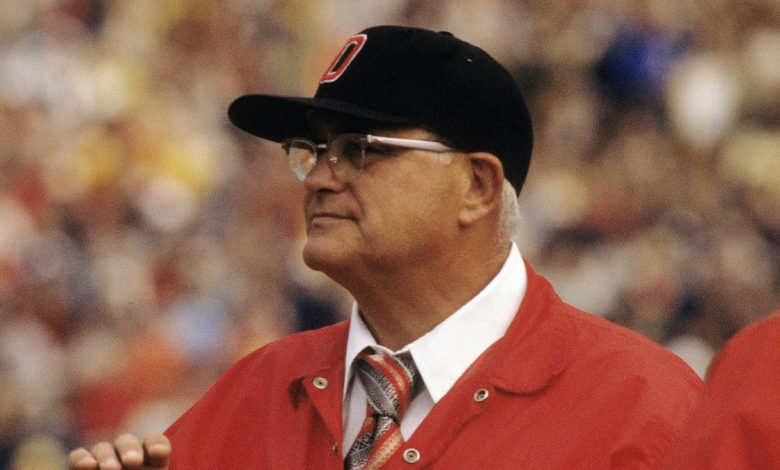Woody Hayes: The Legendary Ohio State Football Coach Who Transformed the Program with Unmatched Passion and Unyielding Leadership

COLUMBUS, Ohio — Few figures in college football history have left a legacy as deep and enduring as Wayne Woodrow “Woody” Hayes, the man who built Ohio State Football into a national powerhouse. With his iron will, tactical brilliance, and unrelenting drive, Hayes not only shaped a program — he redefined what it meant to lead, to coach, and to win in college athletics.
From the early 1950s to the late 1970s, Woody Hayes transformed Ohio State from a respected Midwestern program into a symbol of tradition, dominance, and passion. His name became synonymous with toughness, discipline, and an unbreakable love for Buckeye football.
Born on February 14, 1913, in Clifton, Ohio, Woody Hayes developed a love for football and leadership early in life. After graduating from Denison University — where he also coached briefly — Hayes served as a Navy officer during World War II, an experience that instilled in him a deep sense of order, patriotism, and mission.
In 1951, after a brief coaching stint at Miami University (Ohio), Hayes was hired as the head football coach at Ohio State, a controversial choice at the time. Few predicted just how dramatic and transformative his reign would become.
From 1951 to 1978, Woody Hayes built one of the most dominant football dynasties in the nation. His career at Ohio State included:
- 5 National Championships (1954, 1957, 1961, 1968, 1970)
- 13 Big Ten titles
- 205 wins over 28 seasons
- A .761 winning percentage
- 11 bowl game appearances
Hayes’ coaching style was defined by what he famously dubbed “three yards and a cloud of dust” — a ground-heavy, physical offense centered on ball control, brute strength, and mental toughness. Critics called it conservative. Hayes called it championship football — and the results spoke for themselves.
“Paralyze resistance with persistence,” Hayes often said, underscoring his belief in relentless preparation and effort.
Perhaps nothing defined Hayes’ legacy more than the legendary rivalry with Michigan — particularly his head-to-head battles with Bo Schembechler, his former assistant who took the reins at Michigan in 1969.
This era, known as the “Ten-Year War” (1969–1978), elevated The Game to a national spectacle. Both programs were ranked in the top 10 for nearly every matchup, with Big Ten titles — and national implications — on the line.
Hayes vs. Schembechler became a clash of wills, philosophies, and egos — and college football was never the same.
“I love football. I love beating Michigan,” Hayes once declared.
His hatred for the Wolverines was legendary. He refused to call the school by name, often referring to it only as “That Team Up North.” He once refused to buy gas in Michigan, famously saying, “I’ll push the car back to Ohio.”
Despite his fiery temper and militaristic coaching style, Woody Hayes was a dedicated scholar and educator. He famously taught history classes at Ohio State, and frequently quoted philosophers, war generals, and presidents to inspire his players.
His motto: “You win with people.” And he meant it.
Many of Hayes’ players — including two-time Heisman winner Archie Griffin — described him as a father figure, a mentor, and someone who demanded not just excellence on the field but accountability, humility, and intellectual growth off it.
“He taught us how to be men,” Griffin said. “How to fight for what you believe in, and how to carry yourself when nobody’s watching.”
Woody Hayes’ career came to a controversial and abrupt end on December 29, 1978, during the Gator Bowl against Clemson. After a late interception that sealed the Buckeyes’ loss, Hayes infamously punched Clemson linebacker Charlie Bauman on the sideline — a moment caught by national cameras.
The fallout was immediate. Despite his unmatched legacy, Hayes was fired the next day by Ohio State, ending his 28-year tenure under a cloud of disgrace.
It was a bitter ending, but one that could never erase the greatness he had achieved or the cultural imprint he had left on the university and sport.
Time, reflection, and history have softened the sting of Hayes’ fiery personality and controversial exit. Today, Woody Hayes is remembered not for a single moment, but for a lifetime of leadership, passion, and devotion to Ohio State.
His influence continues to be felt:
- The Woody Hayes Athletic Center, Ohio State’s state-of-the-art training facility, bears his name.
- His “no shortcuts” philosophy is still embraced by Ohio State coaches today.
- He remains a model of coaching passion and player development across generations.
- Countless former players have gone on to become coaches, educators, business leaders — carrying Hayes’ lessons with them.
Woody Hayes was inducted into the College Football Hall of Fame in 1983. He passed away on March 12, 1987, but his presence remains deeply woven into the fabric of Ohio State.
Each year, during rivalry week, former players and coaches invoke his name. His quotes are etched on walls. His memory fuels the Buckeye tradition.
“Without Woody Hayes,” one fan said, “Ohio State isn’t Ohio State.”
Woody Hayes was more than a coach — he was an institution. Fierce. Flawed. Brilliant. Uncompromising. He demanded everything from his players because he gave them everything he had. And in doing so, he built a legacy that will never fade.
From the grit of the ’50s to the glory of the ’60s and the tenacity of the ’70s, Hayes helped forge the identity of one of college football’s most iconic programs.
He didn’t just win games. He built men. He built Ohio State.









